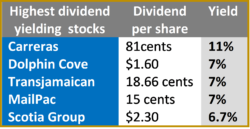Bank of Jamaica held its policy interest rate at 7 percent, citing concerns that there are likely to be temporary upticks in inflation above the target range during the June and September 2023 quarter, affected by recent increases in the cost of communication services, the national minimum wage, seasonally higher agricultural prices as well as pending increases in other regulated prices.
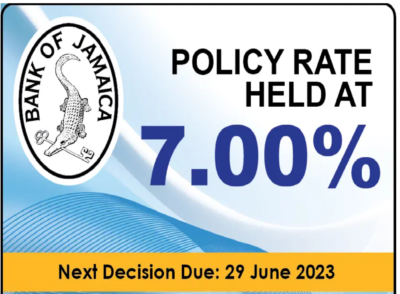 According to the Central Bank, annual inflation is projected to again be within the Bank’s inflation target range of 4 to 6 percent by the December 2023 quarter, but it noted that both core inflation and the consumer price indices are now within the 4-6 percent band at 5.7 and 5.8 percent up to April this year.
According to the Central Bank, annual inflation is projected to again be within the Bank’s inflation target range of 4 to 6 percent by the December 2023 quarter, but it noted that both core inflation and the consumer price indices are now within the 4-6 percent band at 5.7 and 5.8 percent up to April this year.
To continue underpinning inflation returning to the target range and to underwrite continued stability in the foreign exchange market, the Monetary Policy Committee (MPC) unanimously agreed to continue to hold the policy rate and maintain tight Jamaican dollar liquidity in the money market and to foster relative stability in the foreign exchange market.
BOJ holds policy rate at 7%
Interest rates held at 7% for Jamaica
Interest rates set by the Bank of Jamaica held at 7 percent for the overnight deposits, even as inflation continues to fall rapidly in the country and now running at an average of 0.20 percent per month or 2.4 percent annualised since November last year. The monetary Policy Committee determined the decision at meetings held this week.
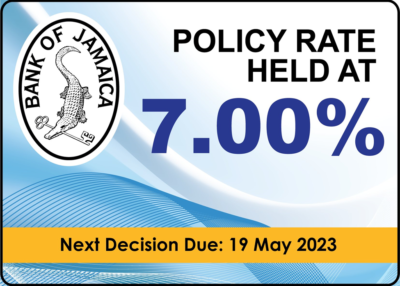 According to the country’s central bank, “Inflation continued to ease, consistent with Bank of Jamaica’s monetary policy and international developments. Jamaica’s inflation rate to February 2023 of 7.8 percent was below the rate of 8.1 percent at January 2023. The February outturn was the lowest rate since December 2021.”
According to the country’s central bank, “Inflation continued to ease, consistent with Bank of Jamaica’s monetary policy and international developments. Jamaica’s inflation rate to February 2023 of 7.8 percent was below the rate of 8.1 percent at January 2023. The February outturn was the lowest rate since December 2021.”
The key external drivers of headline inflation, such as grains, fuel and shipping prices, continued to decline, broadly in line with the Bank’s expectations. In addition, inflation expectations continued to track.
Core inflation (excluding food and fuel prices from the Consumer Price Index) at February 2023 also decelerated to 6.6 percent from 7.1 percent at January 2023 and is projected to fall further as monetary policy remains tight.
Annual inflation is projected to continue to fall to the Bank’s inflation target range of 4 to 6 percent by the December 2023 quarter. One-off regulated price adjustments may, however, result in a temporary uptick in inflation.
Notwithstanding positive developments in inflation, “the MPC noted that the risks to the inflation outlook remain elevated. In a context where the domestic economy continues to grow, labour market shortages carry the potential for future wage adjustments that can put upward pressure on inflation.
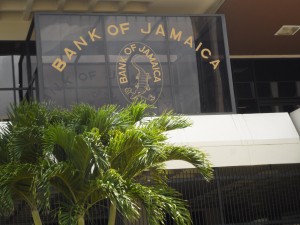
BOJ holds overnight rate.
Higher inflation could also result from a worsening in supply chain conditions and higher commodity prices if there are further geo-political disruptions. Among the factors that could lead to lower-than-projected inflation, weaker-than-expected global growth could negatively affect domestic demand, and some projected adjustments to regulated prices may not materialise.”
“Therefore, to continue underpinning inflation returning to the target range and to underwrite continued stability in the foreign exchange market, the MPC unanimously agreed to hold the policy interest rate at 7 percent, to maintain tight Jamaican dollar liquidity in the money market and to continue fostering relative stability in the foreign exchange market. The Bank’s liquidity management strategy incorporates the impact of the one percentage point increase in the domestic and the foreign currency Cash Reserve Requirements applicable to DTIs, effective the beginning of April 2023.”
BOJ hikes interest rate higher to 5.50%
The Bank of Jamaica hikes its overnight rate once more by 0.50 percent to 5.50 percent following the latest meeting of the Monetary Policy Committee (MPC).
The decision the bank stated was “unanimously agreed to” by MPC who “also decided to continue pursuing other measures to contain Jamaican dollar liquidity expansion and maintain relative stability in the foreign exchange market.”
The Committee noted that “while inflation at May 2022 of 10.9 percent was lower than inflation at April 2022, core inflation remained elevated and headline inflation is likely to continue to breach the Bank’s target range over the next year.”
“while inflation at May 2022 of 10.9 percent was lower than inflation at April 2022, core inflation remained elevated and headline inflation is likely to continue to breach the Bank’s target range over the next year.”
The MPC noted that its current decision reflects a cumulative increase in the policy rate of 500 bps since October 2021, which has taken the policy rate closer to the level that the Committee considers appropriate. The bank stated that “the measures are also aimed at reducing economic demand and, consequently, the ability of businesses to pass on price increases to consumers. These decisions are also expected to continue to support a relatively more stable foreign exchange market.”
BOJ interest rate folly
Bank of Jamaica (BOJ) unwarrantedly, increased the policy interest rate, they offer to deposit-taking institutions on overnight placements with BOJ by 50 basis points to 5 percent per annum, effective 20 May 2022, with a view to continuing slaying inflation that is well past its peak from September last year.
 According to a release from the BOJ, “Inflation at April 2022 of 11.8 percent was higher than the outturn at March 2022 and represented the ninth consecutive month that inflation has been above the Bank’s target range of 4 to 6 percent. While inflation is forecasted to rise further over the next two months, the Bank forecasts inflation to fall in the second half of the year, consistent with consensus forecast for a fall in commodity prices.”
According to a release from the BOJ, “Inflation at April 2022 of 11.8 percent was higher than the outturn at March 2022 and represented the ninth consecutive month that inflation has been above the Bank’s target range of 4 to 6 percent. While inflation is forecasted to rise further over the next two months, the Bank forecasts inflation to fall in the second half of the year, consistent with consensus forecast for a fall in commodity prices.”
The above misses the critical point, with inflation improving since October last year with an average rate of 6.8 percent, just over the BOJ target range. The central bankers fooled around for a major part of 2021 in defending the excessively low interest rates when inflation was getting out of hand. They are erroneously focused on crawling inflation over a twelve month period rather than seeing what was taking place under their feet currently.
They are now making the mistake in the opposite direction when inflation is in decline and close to their 4 to 6 percent band. Available data shows the worse of the inflation was between May and October last year, then running at an average rate of nearly 15 percent per annum, since then, it has been just under six percent per annum, with little help from BOJ as the tighter monetary policy started in late September is just about now likely to start having the effect.
The recently harsh hike in interest rates is not the tool really meant to tame inflation but one more in keeping with reducing demand for US dollars.
According to the Central Bank, “The measures are expected to cause interest rates on deposits and loans to rise further, making savings in Jamaican dollars more attractive relative to foreign currency assets and borrowing in Jamaican dollars more expensive. They are also expected to reduce the demand for foreign currency, leading to a relatively more stable exchange rate.

BOJ interest cuts overnight rate.
The measures are also expected to cause demand in the economy to fall and, consequently, limit the ability of businesses to pass on price increases to consumers.”
It is difficult to be driving a vehicle backward over a long distance to get to one’s destination, accordingly, BOJ should not be setting policy based on what inflation was in the past but on what is likely in the future. Past inflation hikes are irrelevant to future rates once the rates are tamed, as the data now shows. Accordingly, BOJ recent big jump in rates is a mistake and should have been implemented early last year and over several months. The last three rate increases amount to applying drastic medicine after the ailment is well on the way to being cured.
This publication has written in the past disagreeing with the excessively low rate and how it was reducing the value of savers’ money while starving pensioners and small savers of badly needed income. There always is a need for a balance, either way, BOJ has gone too far and far too late.
Bank of Jamaica inflation response worsened
Inflation in Jamaica is getting better, not worse, contrary to the recent statement by the Bank of Jamaica, to the contrary in justifying a steep hike in overnight deposit interest rates by 1.5 percent to 4 percent starting on Monday.

BOJ hikes overnight rate.
Yes, the point to point inflation rate moved up to 9.7 percent, giving the impression that inflation is getting out of hand, but that number does not tell the true story. The 4 percent interest rate will help savers get a more realistic rate on their savings.
The bank really had no significant new information that they did have when rates were raised between September and December, last year. If anything, the new information indicates clearly that inflation is moderating not worsening.
What are the facts? In January and February, last year inflation was negative 1.6 and 0.1 percent respectively and jumped to 1.1 percent in March while slipping to 0.5 percent in April, for a negative year to date inflation then, of 1.1 percent. Between May and September when BOJ moved rates up by 100 basis points inflation was the worse for the year at 1.32 percent per month or annualized 16 percent that is well up from 0.48 percent per month or 5.76 percent. The high rate of inflation suggests the bank should have moved earlier to raise rates than in September.
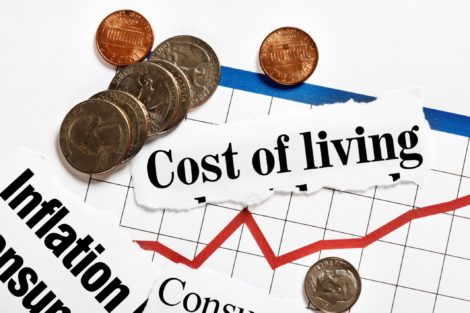 Inflation since the first interest rate move in September, is running at 0.6 percent per month or 7.2 percent per annum just slightly above the BOJ range of 4-6 percent. The average for the last three months is running at an average of 0.47 percent or 5.64 percent annualized, well below the 16 percent per annum for the period indicated above.
Inflation since the first interest rate move in September, is running at 0.6 percent per month or 7.2 percent per annum just slightly above the BOJ range of 4-6 percent. The average for the last three months is running at an average of 0.47 percent or 5.64 percent annualized, well below the 16 percent per annum for the period indicated above.
Negative inflation in January 2021 was due to a steep decline in the prices of vegetables and tubers a development that was not sustainable, as such the underlying inflation was more likely positive than negative as such the 0.6 percent increase in January this year is not out of line and is better than the December rate of 0.8 percent. The question to be answered is what can justify a sharp interest rate increase to tame much more moderate inflation over the past three months compared to when the rates were initially raised in September and on two other occasions last year by much smaller amounts that that starting on Monday?
 At the latest auction of the Bank of Jamaica Fixed Rate
At the latest auction of the Bank of Jamaica Fixed Rate 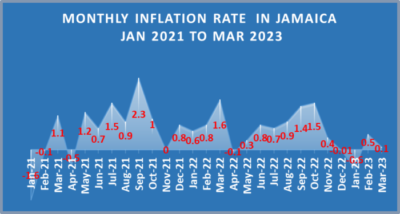 The job of fighting high inflation may be substantially done for this round, how efficiently was it executed is another matter that the country needs to have answered. A careful look at reports emanating from the Bank of Jamaica tells a tale of what looks more like guesswork, than scholarly assessment. Don’t take our word for it, compare BOJ’s utterances since 2021 and their outturn.
The job of fighting high inflation may be substantially done for this round, how efficiently was it executed is another matter that the country needs to have answered. A careful look at reports emanating from the Bank of Jamaica tells a tale of what looks more like guesswork, than scholarly assessment. Don’t take our word for it, compare BOJ’s utterances since 2021 and their outturn. In May, last year they made an erroneous statement that inflation was still moving higher and would increase over the next two months, in fact the underlying data was suggesting that it was improving. Importantly, at their last meeting at which they reviewed the state of inflation they felt so comfortable that things were in line with their forecast that the next meeting was set for May. Had they looked at the real message that had been screaming at them for 2022 and more so since November they would have taken action to reduce overnight interest rates from then.
In May, last year they made an erroneous statement that inflation was still moving higher and would increase over the next two months, in fact the underlying data was suggesting that it was improving. Importantly, at their last meeting at which they reviewed the state of inflation they felt so comfortable that things were in line with their forecast that the next meeting was set for May. Had they looked at the real message that had been screaming at them for 2022 and more so since November they would have taken action to reduce overnight interest rates from then.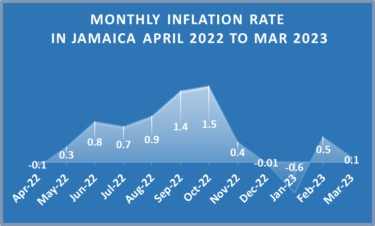 If history is anything to go by, the next three months should see relatively low inflation, suggesting that the current average of 0.2 per month could continue for a few more months. The fall has been consistent, although the rate for a few months exceeded this pace.”
If history is anything to go by, the next three months should see relatively low inflation, suggesting that the current average of 0.2 per month could continue for a few more months. The fall has been consistent, although the rate for a few months exceeded this pace.” It does not take much to determine the future of the stock market, the direction of interest rates tells it all, well, almost, but profits cannot be ignored. The accompanying chart suggests that the Bank of Jamaica’s recent hikes in interest rates won’t last much longer, a fact that stock market investors need to ponder early in 2023.
It does not take much to determine the future of the stock market, the direction of interest rates tells it all, well, almost, but profits cannot be ignored. The accompanying chart suggests that the Bank of Jamaica’s recent hikes in interest rates won’t last much longer, a fact that stock market investors need to ponder early in 2023. 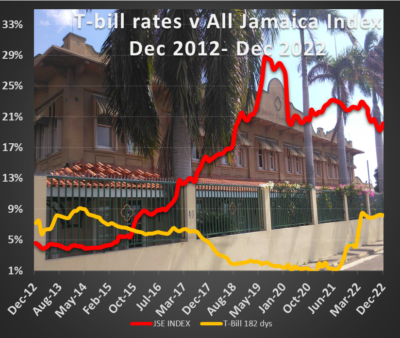 Bank of Jamaica moved their overnight interest rates charged to banks from 0.50 percent in September 2021 to 7 percent in November last year, a measure implemented mainly to tame inflation. Inflation has cooled sharply from the high in 2021 and is on the way down. The foreign exchange market buoyancy resulted in some appreciation of the Jamaican dollar, while the NIR seems to have risen to record levels for an end of year close.
Bank of Jamaica moved their overnight interest rates charged to banks from 0.50 percent in September 2021 to 7 percent in November last year, a measure implemented mainly to tame inflation. Inflation has cooled sharply from the high in 2021 and is on the way down. The foreign exchange market buoyancy resulted in some appreciation of the Jamaican dollar, while the NIR seems to have risen to record levels for an end of year close.


